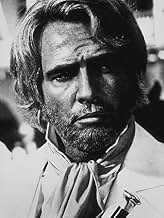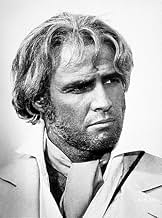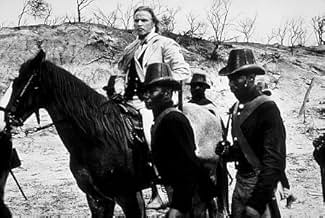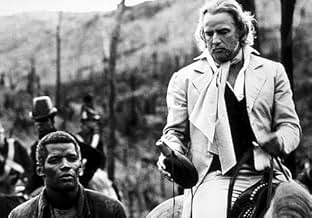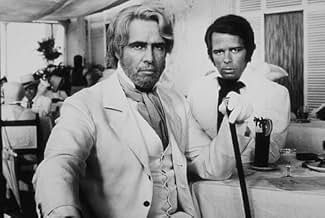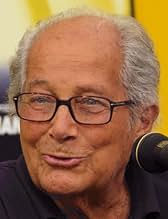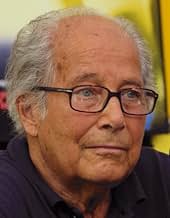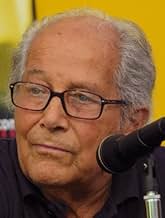In 1844, a British mercenary helps the revolting slaves of an Antilles island colony gain independence from Portugal, but later returns to hunt down a local rebel leader and former protégé.In 1844, a British mercenary helps the revolting slaves of an Antilles island colony gain independence from Portugal, but later returns to hunt down a local rebel leader and former protégé.In 1844, a British mercenary helps the revolting slaves of an Antilles island colony gain independence from Portugal, but later returns to hunt down a local rebel leader and former protégé.
- Awards
- 5 wins & 1 nomination total
- José Dolores
- (as Evaristo Marquez)
- Juanito
- (as Joseph P. Persaud)
- Soldier
- (as Alvaro Medrano)
- Engl. Major
- (as Alejandro Obregon)
- Lady Bella
- (uncredited)
- Man on the ship
- (uncredited)
- Ramón
- (uncredited)
Storyline
Did you know
- TriviaMarlon Brando once said this film contains "the best acting I've ever done."
- GoofsPortugal never had any colonies in the Caribbean. Its only American colony, Brazil, has no coast in the Caribbean.
- Quotes
Sir William Walker: Gentlemen, let me ask you a question. Now, my metaphor may seem a trifle impertinent, but I think it's very much to the point. Which do you prefer - or should I say, which do you find more convenient - a wife, or one of these mulatto girls? No, no, please don't misunderstand: I am talking strictly in terms of economics. What is the cost of the product? What is the product yield? The product, in this case, being love - uh, purely physical love, since sentiments obviously play no part in economics.
[general laughter]
Sir William Walker: Quite. Now, a wife must be provided with a home, with food, with dresses, with medical attention, etc, etc. You're obliged to keep her a whole lifetime even when she's grown old and perhaps a trifle unproductive. And then, of course, if you have the bad luck to survive her, you have to pay for the funeral!
[general laughter]
Sir William Walker: It's true, isn't it? Gentlemen, I know it's amusing, but those are the facts, aren't they? Now with a prostitute, on the other hand, it's quite a different matter, isn't it? You see, there's no need to lodge her or feed her, certainly no need to dress her or to bury her, thank God. She's yours only when you need her, you pay her only for that service, and you pay her by the hour! Which, gentlemen, is more important - and more convenient: a slave or a paid worker?
- Alternate versionsThe complete version of this film runs 132 minutes. A 112-minute version under the title "Burn!" was released in the USA and the UK.
- ConnectionsFeatured in Pontecorvo: The Dictatorship of Truth (1992)
Ten years pass, and the sugar industry now requires peace and stability on Quemada. The continuing guerilla campaign by the dispossessed blacks is harming profits. The very same English adventurer is once more despatched to the island, this time to hunt down and eradicate the revolutionaries he created.
Marlon Brando plays Sir William Walker in his best Fletcher Christian English accent and a blonde wig with a life of its own. His is a thoughtful performance, putting across the complexity of the man, a character who is undoubtedly cynical and unscrupulous, but who is also an emotional man and something of a political philosopher. He is certainly effective at what he does.
The direction of Gillo Pontecorvo is somewhat erratic at times. There are points where the narrative is confused, and the gold robbery which drives the plot somehow got left on the cutting-room floor. Jose Dolores' rise to power is the most significant event in the story, but we see nothing of it. During the voodoo carnival, two of the participants are wearing 20th-century soccer shorts. The film's central pivot, the passage of ten years between Walker's two visits to the island, is handled very sketchily by means of a few incongruous London scenes and a voice-over narration.
But there are good things, too. When Santiago's widow hauls her husband's body away, the masonry of the fort stands as a silent metaphor of colonial power - harsh, overbearing and sterile. Brando has some fine speeches, musing on the nature of political legitimism. The fire scenes are visually arresting (though it would have sufficed to have two or three guerillas being shot as they emerged from the burning sugar cane: seven or eight is labouring the point), and Walker is positively luminous against the tortured black shapes of the charred forest, showing in symbolic form that this man thrives on the suffering of the blacks, and that destruction is his natural element.
- How long is Burn!?Powered by Alexa
Details
- Release date
- Countries of origin
- Languages
- Also known as
- Kvemada: Ostrvo u plamenu
- Filming locations
- Production companies
- See more company credits at IMDbPro
Box office
- Gross US & Canada
- $431,817
- Runtime1 hour 52 minutes
- Color
- Aspect ratio
- 1.66 : 1
Contribute to this page



